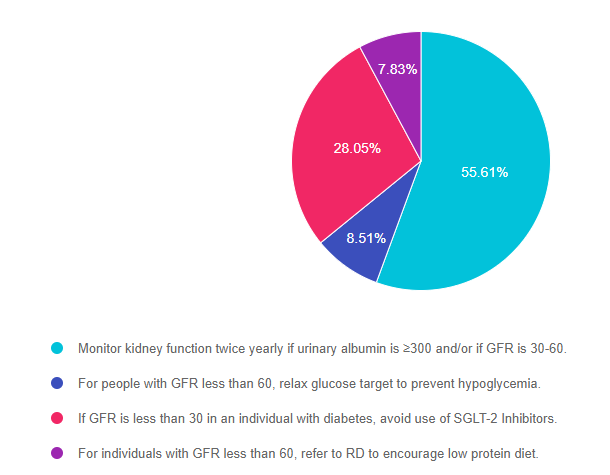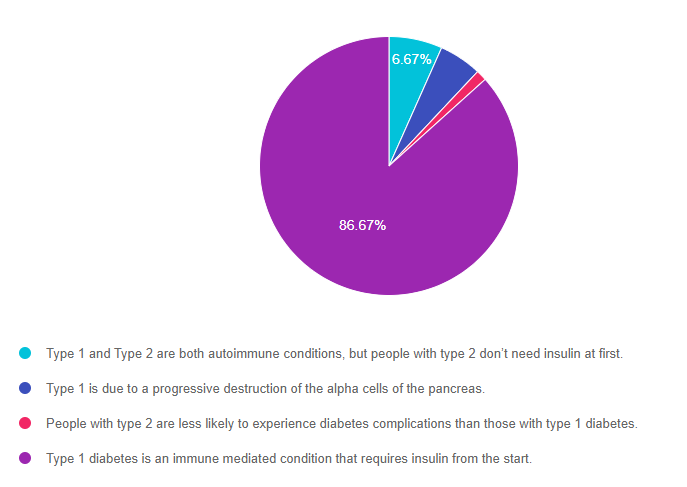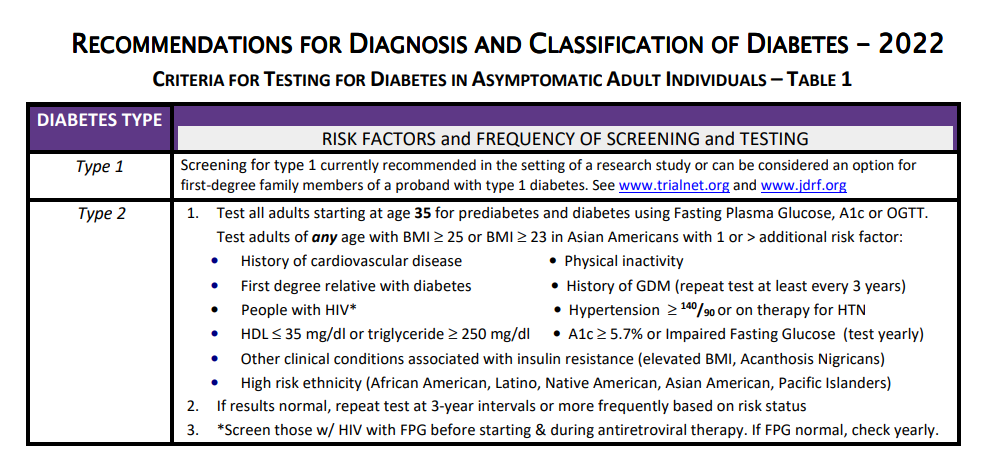Rationale of the Week | New Standards for Kidney Disease

We quizzed test takers on the new ADA Standards of Care for Kidney Disease. 56% of respondents chose the best answer. We want to share this important info so you can pass it on to people living with diabetes and your colleagues, plus prepare for exam success!
Before we start though, if you don’t want any spoilers and haven’t tried the question yet, you can answer below: Answer Question
Question: Based on the 2022 ADA Standards of Care, which of the following is the most accurate statement regarding chronic kidney disease and risk management?
Answer Choices:
- Monitor kidney function twice yearly if urinary albumin is 300 or greater and/or if GFR is 30-60.
- For people with GFR less than 60, relax glucose target to prevent hypoglycemia.
- If GFR is less than 30 in an individual with diabetes, avoid use of SGLT-2 Inhibitors.
- For individuals with GFR less than 60, refer to RD to encourage low protein diet.

As shown above, the most common choice was option 1, the second most common answer was option 3, then option 2, and then finally option 4.
Getting to the Best Answer
Answer 1 is correct. 55.61% chose this answer, “Monitor kidney function twice yearly if urinary albumin is 300 or greater and/or if GFR is 30-60.” YES, GREAT JOB. Most of you chose the best answer for this new recommendation. Catching renal failure early can be life saving. Two big indicators of serious renal issues include proteinuria and a diminished GFR. Early interventions (including getting BG and BP to goal) and regular monitoring can protect kidneys for the long run.
Answer 2 is incorrect. 8.51% of you chose this answer, “If GFR is less than 30 in an individual with diabetes, avoid use of SGLT-2 Inhibitors.” This is a juicy answer. The GFR cut-offs for the SGLT-2s have been changing a lot over the past year. More research is showing that, in some cases, even with a GFR less than 30 (especially in the presence of proteinuria) SGLT-2s are indicated since they have a renal protective effect. See ADA Standard 11 on Chronic Kidney Disease for more info.
Answer 3 is incorrect. 28.05% of respondents chose this answer, “People with type 2 are less likely to experience diabetes complications than those with type 1 diabetes.” According the the National Kidney Foundation, “About 30 percent of people with Type 1 diabetes and 10 to 40 percent of those with Type 2 diabetes eventually experience kidney failure.” The most important message is to encourage people with diabetes to be actively involved in their treatment plan and advocate for best medical care to protect renal function.
Finally, Answer 4 is incorrect. 7.83% chose this answer, “For individuals with GFR less than 60, refer to RD to encourage low protein diet.” This is an outdated recommendation for over the past five years. The ADA recognized that the science does not support low protein diets as a protective intervention for those with renal disease. For people with nondialysis-dependent stage 3 or higher chronic kidney disease, dietary protein intake recommendation is 0.8 g/kg body weight per day.
We hope you appreciate this week’s rationale! Thank you so much for taking the time to answer our Question of the Week and participate in this important learning activity!
Want to learn more about this topic?
Enroll in Our Standards of Care Intensive | Level 2
This bundle is specifically designed for healthcare professionals who want to learn more about the ADA Standards of Diabetes Care for their clinical practice or for those who are studying for the BC-ADM or the CDCES certification exam.
2022 Live Webinar Updates
- Recorded December 15, 2021 – Hyperglycemic Crises, DKA & HHS Standards | 1.0 CE
- Recorded December 21, 2021 – Assessing and Promoting Well-Being: From Population Health to a Person-Centered Approach Standards | 1.5 CEs
- February 3, 2022 – ADA Standards of Care | 2.0 CEs
- March 24, 2022 – Meds Management for Type 2 – 1.5 CEs
- March 29, 2022 – Lower Extremity Assessment 1.5 CEs
- April 26, 2022 – Microvascular Complications, Eye, Kidney Nerve Disease 1.5 CEs
- April 28, 2022 – Critical Assessment of Diabetes Patient 2.0 CEs
- May 10, 2022 – Cardiovascular Disease and Diabetes Standards 1.5 CEs
- May 12, 2022 – Older Adults and DIabetes 1.5 CEs
- May 17, 2022 – Tots to Teens – Diabetes Standards 1.5 CEs
- May 19, 2022 – Pregnancy and Diabetes 1.5 CEs
- May 26, 2022 – Hospital and Hyperglycemia 1.5 CEs
- July 21, 2022 – Setting up a Successful Diabetes Program 1.5 CEs
Don’t worry if you can’t make it live. Your registration guarantees access to the recorded version in the Online University.
All hours earned count toward your CDCES Accreditation Information
Intended Audience: A great course for healthcare professionals in the field of diabetes education looking for a straightforward explanation of identification and treatment of hyperglycemic crises.
Instructor: Beverly Thomassian RN, MPH, CDCES, BC-ADM is a working educator and a nationally recognized diabetes expert.
Sign up for Diabetes Blog Bytes – we post one daily Blog Byte from Monday to Friday. And of course, Tuesday is our Question of the Week. It’s Informative and FREE! Sign up below!
[yikes-mailchimp form=”1″]The use of DES products does not guarantee the successful passage of the CDCES exam. CBDCE does not endorse any preparatory or review materials for the CDCES exam, except for those published by CBDCE.
New! Take Your CDCES Exam From Home or Office
Wow! This is fantastic news. I sit for the CBCDE Exam for the 7th time this year, and I am definitely going to take advantage of this remote feature! ~ Coach Beverly
The Certification Board for Diabetes Care & Education (CBDCE) is now offering the opportunity to take your Certified Diabetes Care and Education Specialist (CDCES) exam remotely!
Starting in 2022, you have the option to take your certification exam using their new Live Remote Online Proctoring (LRP) platform.

LRP is a secure and non-invasive platform that uses professional proctors and technology to monitor candidates live while they complete the Certification Examination for Diabetes Care and Education Specialists (Exam). This method of test delivery allows the candidate to take the exam from their home, office or a remote site, using their own computer. The process is secure, easily accessible, and monitors testing activity and records all aspects of the exam testing session.
Get Familiar with the Requirements
During your exam appointment, you will be connected with a moderator who will guide you through the process and be there throughout your entire exam. You will need to share your screen and broadcast yourself during your entire exam. Your workspace should be quiet, tidy, and free of any study notes/materials.
No electronics are allowed and participants are not allowed to take a break. In addition, the moderator can request to rescan your workspace to make sure it is free of study notes and materials. After you take the exam, you will instantly get a report of your results.
To connect to the LRP platform, you will need a computer with a webcam and microphone. The CBDCE recommends that you run compatibility tests before your exam to ensure your equipment is compatible.
Sign up for Diabetes Blog Bytes – we post one daily Blog Byte from Monday to Friday. And of course, Tuesday is our Question of the Week. It’s Informative and FREE! Sign up below!
Question of Week | With New Guidelines, who needs testing for hyperglycemia?

Based on the 2022 ADA Standards and Screening Guidelines, which one of the following people would need to be tested for hyperglycemia?
- RJ, a 36-year-old with a BMI of 23
- LS, a 32-year-old with a history of gastritis
- JM, a 33-year-old who smokes a pack a day
- KT, a 34-year-old who has bilateral pedal edema
Click Here to Test your Knowledge
You are invited to join Coach Bev on February 3rd at 11:30 for an intensive 2-hour live webinar reviewing what Diabetes Specialists need to know about the updated standards.
Enroll in our Level 2 | ADA Standards of Care | 2.0 CEs
This course, updated annually, is an essential review for anyone in the field of diabetes. Join Coach Beverly as she summarizes the 2022 updates to the American Diabetes Association’s Standards of Medical Care in Diabetes and provides critical teaching points and content for health care professionals involved in diabetes care and education.
Objectives:
- A review of changes and updates to the 2022 ADA Standards of Medical Care
- Identification of key elements of the position statement
- Discussion of how diabetes educators can apply this information in their clinical setting
Intended Audience: This course is a knowledge-based activity designed for individuals or groups of diabetes educators, including RNs, RDs, Pharmacists, Nurse Practitioners, Clinical Nurse Specialists, Physician Assistants, and other health care providers interested in staying up to date on current practices of care for their patients with diabetes and other related conditions.
Instructor: Beverly Thomassian RN, MPH, CDCES, BC-ADM is a working educator and a nationally recognized diabetes expert.
Enroll in our entire Level 2 – Standards of Care to join us for the below 2022 Live Webinar Updates. All courses air at 11:30 a.m. (PST)
- Recorded on December 15, 2021 – Hyperglycemic Crises, DKA & HHS Standards | 1.0 CE
- Recorded on December 21, 2021 – Assessing and Promoting Well-Being: From Population Health to a Person-Centered Approach Standards | 1.5 CEs
- February 3, 2022 – ADA Standards of Care | 2.0 CEs
- March 24, 2022 – Meds Management for Type 2 – 1.5 CEs
- March 29, 2022 – Lower Extremity Assessment 1.5 CEs
- April 26, 2022 – Microvascular Complications, Eye, Kidney Nerve Disease 1.5 CEs
- April 28, 2022 – Critical Assessment of Diabetes Patient 2.0 CEs
- May 10, 2022 – Cardiovascular Disease and Diabetes Standards 1.5 CEs
- May 12, 2022 – Older Adults and DIabetes 1.5 CEs
- May 17, 2022 – Tots to Teens – Diabetes Standards 1.5 CEs
- May 19, 2022 – Pregnancy and Diabetes 1.5 CEs
- May 26, 2022 – Hospital and Hyperglycemia 1.5 CEs
- July 21, 2022 – Setting up a Successful Diabetes Program 1.5 CEs
All hours earned count toward your CDCES Accreditation Information
Studying for the CDCES Exam?
Enroll in CDCES Online Prep Bundle + 5th Ed ADCES Review Guide Book | 47 CEs
This bundle includes our CDCES Online Prep Bundle plus the ADCES Review Guide.
The online bundle includes Level 1, Level 2, and Level 3 (Boot Camp), plus two bonus courses. The ADCES Review Guide offers over 480+ practice questions and is a fantastic independent study tool and comprehensive resource for the Diabetes Care and Education Specialist Exam.
Sign up for Diabetes Blog Bytes – we post one daily Blog Byte from Monday to Friday. And of course, Tuesday is our Question of the Week. It’s Informative and FREE! Sign up below!
[yikes-mailchimp form=”1″]The use of DES products does not guarantee the successful passage of the CDCES exam. CBDCE does not endorse any preparatory or review materials for the CDCES exam, except for those published by CBDCE.
January eNews | New 2022 Diabetes Standards – Screening Updates and Cheat Sheets

January eNews | New 2022 Diabetes Standards – Screening Updates and Cheat Sheets
Happy New Year
January kicks off our ADA Standards of Care (SOC) celebration and exploration. Coach Beverly has discovered some real gems that she is excited to share with all of you.
“By implementing and championing these evidence-based guidelines, we can make a significant impact in improving care.”
Our goal is to highlight key areas and changes to the standards that will benefit people with diabetes the most.
In this first newsletter of 2022, we feature the new screening guidelines for prediabetes and diabetes. Plus, we explore other important additions and changes to the standards, including a new standard on the prevention and management of chronic kidney disease and vaccination updates.
We look at the relationship between cannabis, hyperemesis, and ketoacidosis for those living with type 1 diabetes. Plus, we invite you to test your knowledge with our Question of the week based on the 2022 SOC.
Coach Beverly updated our Cheat Sheets to reflect the SOC updates so you can download these helpful references and study tools. Lastly, our 2022 medications and glucagon PocketCards are back from the printer and ready for mailing.
With the New Year, you might have set a goal or two for yourself. I hope you have success, but if not, that is okay too.
Coach Beverly, Bryanna, and Jackson
Click here to read our full December 2022 newsletter.
Featured Articles
- ADA Standards 2022 – Important Updates
- New 2022 Cheat Sheets for Screening and Insulin
- Type 1, Cannabis, and DKA
- Take the CDCES from Home Starting in 2022
- Question of the Week
- Rationale of the Week
Upcoming Webinars
- CDCES Prep | Jan 26th
- BC-ADM Prep | Feb 9th
- Diabetes Fundamentals | Begins Jan 11th
- ADA Standards| Feb 3rd
Featured Items
- CDCES Prep Bundle + Review Guide
Want to learn more about this topic?
Enroll in our Diabetes Fundamentals | Level 1
Airs Live Jan 11th – Jan 27th, 2022 at 11:30 am PST
This bundle is specifically designed for healthcare professionals who want to learn more about diabetes fundamentals for their clinical practice or for those who are studying for the Certified Diabetes Care and Education Specialist (CDCES) exam.
2022 Live Webinar Updates
- January 11, 2022 – Class 1 – Getting to the Nitty Gritty 1.5 CEs
- January 13, 2022 – Class 2 – Nutrition and Exercise 1.5 CEs
- January 18, 2022 – Class 3 – Insulin Therapy & Pattern Management 1.5 CEs
- January 20, 2022 – Class 4 – Meds Overview for Type 2 – 1.5 CEs
- January 25, 2022 – Class 5 – Goals of Care – 1.5 CEs
- January 27, 2022 – Class 6 – Hypoglycemia, Sick Days, Monitoring, Foot Care 1.5 CEs
Intended Audience: A great course for healthcare professionals in the field of diabetes education looking for a straightforward explanation of identification and treatment of hyperglycemic crises.
Instructor: Beverly Thomassian RN, MPH, CDCES, BC-ADM is a working educator and a nationally recognized diabetes expert.
All hours earned count toward your CDCES Accreditation Information
Sign up for Diabetes Blog Bytes – we post one daily Blog Byte from Monday to Friday. And of course, Tuesday is our Question of the Week. It’s Informative and FREE! Sign up below!
[yikes-mailchimp form=”1″]The use of DES products does not guarantee the successful passage of the CDCES exam. CBDCE does not endorse any preparatory or review materials for the CDCES exam, except for those published by CBDCE.
Rationale of the Week | Type 1 vs Type 2 Diabetes?

We quizzed test takers on the difference between Type 1 & Type 2 Diabetes. 87% of respondents chose the best answer. We want to share this important info so you can pass it on to people living with diabetes and your colleagues, plus prepare for exam success!
Before we start though, if you don’t want any spoilers and haven’t tried the question yet, you can answer below: Answer Question
Question: JS has newly diagnosed type 1, yet their parent has type 2 diabetes. They ask you the difference between the two types of diabetes.
What is your best response?
Answer Choices:
- Type 1 and Type 2 are both autoimmune conditions, but people with type 2 don’t need insulin at first.
- Type 1 is due to a progressive destruction of the alpha cells of the pancreas.
- People with type 2 are less likely to experience diabetes complications than those with type 1 diabetes.
- Type 1 diabetes is an immune mediated condition that requires insulin from the start.

As shown above, the most common choice was option 4, the second most common answer was option 1, then option 2, and then finally option 3.
Getting to the Best Answer
Answer 1 is incorrect. 6.67% chose this answer, “Type 1 and Type 2 are both autoimmune conditions, but people with type 2 don’t need insulin at first.” Only type 1 diabetes is considered an immune mediated condition where there is autoimmune destruction of the beta cells. About 30% of people with type 2 will eventually require insulin due to gradual loss of beta cells.
Answer 2 is incorrect. 5.33% of you chose this answer, “Type 1 is due to a progressive destruction of the alpha cells of the pancreas.” In type 1 diabetes, there is destruction of the beta cells that produce insulin, not the alpha cells. Alpha cells produce glucagon, an important hormone that increases glucose levels.
Answer 3 is incorrect. 1.33% of respondents chose this answer, “People with type 2 are less likely to experience diabetes complications than those with type 1 diabetes.” Complications are a result of a complex interplay of genetics, lifestyle and duration plus severity of hyperglycemia. Many people with type 2 diabetes already have complications at diagnosis due to unknowingly having diabetes for an average of six years.
Finally, Answer 4 is correct. 86.67% chose this answer, “Type 1 diabetes is an immune mediated condition that requires insulin from the start.” YES, This is best answer. All people diagnosed with type 1 diabetes immediately need exogenous insulin since their beta cells have been destroyed and they are at risk for hyperglycemic crisis due to insulinopenia.
We hope you appreciate this week’s rationale! Thank you so much for taking the time to answer our Question of the Week and participate in this important learning activity!
Want to learn more about this topic?
Enroll in our Diabetes Fundamentals | Level 1
Airs Live Jan 11th – Jan 27th, 2022 at 11:30 am PST
This bundle is specifically designed for healthcare professionals who want to learn more about diabetes fundamentals for their clinical practice or for those who are studying for the Certified Diabetes Care and Education Specialist (CDCES) exam.
2022 Live Webinar Updates
- January 11, 2022 – Class 1 – Getting to the Nitty Gritty 1.5 CEs
- January 13, 2022 – Class 2 – Nutrition and Exercise 1.5 CEs
- January 18, 2022 – Class 3 – Insulin Therapy & Pattern Management 1.5 CEs
- January 20, 2022 – Class 4 – Meds Overview for Type 2 – 1.5 CEs
- January 25, 2022 – Class 5 – Goals of Care – 1.5 CEs
- January 27, 2022 – Class 6 – Hypoglycemia, Sick Days, Monitoring, Foot Care 1.5 CEs
Intended Audience: A great course for healthcare professionals in the field of diabetes education looking for a straightforward explanation of identification and treatment of hyperglycemic crises.
Instructor: Beverly Thomassian RN, MPH, CDCES, BC-ADM is a working educator and a nationally recognized diabetes expert.
All hours earned count toward your CDCES Accreditation Information
Sign up for Diabetes Blog Bytes – we post one daily Blog Byte from Monday to Friday. And of course, Tuesday is our Question of the Week. It’s Informative and FREE! Sign up below!
[yikes-mailchimp form=”1″]The use of DES products does not guarantee the successful passage of the CDCES exam. CBDCE does not endorse any preparatory or review materials for the CDCES exam, except for those published by CBDCE.
Cannabis, DKA and Vomiting? New Diagnosis Proposed

As a diabetes specialist in a rural clinic, many of my clients’ use marijuana to help them cope with chronic neuropathy.
Due to hyperemesis and other factors, people with type 1 diabetes who use cannabis on a regular basis, may present to the emergency room with diabetes ketoacidosis (DKA).
However, their unusual labs might cause some initial confusion in determining the correct diagnosis.
In a study that appeared in Diabetes Care, researchers followed people with type 1 admitted to the emergency department for DKA over a five-year period. On admission, they checked to see if they were cannabis positive. Of the 68 people with type 1 in DKA (out of 172 DKA events) who had cannabis in their system, the lab results were surprising. Usually, people in diabetes ketoacidosis have a low pH (less than 7.3) and a low bicarbonate, due to the presence of excess ketone bodies. However, for those with positive cannabis, their pH (mean 7.42 vs 7.09) and bicarbonate (mean 19.2 mmol/L vs 9.1 mmol/L) respectively, were both elevated compared to non users. But their glucose levels, anion gap and beta-hydroxybutyrate were similarly elevated in both groups.
The authors speculate that this paradoxical presentation may be due to vomiting syndromes associated with cannabis use.
Frequent marijuana use can lead to cannabinoid hyperemesis syndrome (CHS). CHS is defined as recurrent nausea, vomiting and cramping abdominal pain that is sometimes associated with at least weekly cannabis use. A common treatment for this syndrome is hot bath or shower.
With heavier marijuana use, people are at risk for cyclic vomiting syndrome (CVS), in which they experience unrelenting nausea and vomiting. The most effective treatment for this is to abstain from cannabis for at least a few weeks. People with type 1 diabetes and gastroparesis are especially at risk for both CHS and CVS. A person with type 1 and gastroparesis is also more at risk for other neuropathies and the associated chronic, often debilitating pain.
The authors are eager to share their findings and suggest screening for cannabis for those admitted with type 1 in hyperglycemic crisis, especially if the person presents with an elevated pH and bicarbonate. The researchers suggest a new term, “Hyperglycemic ketosis due to cannabis hyperemesis syndrome” or HK-CHS.
The diagnostic criteria for hyperglycemic ketosis due to cannabis hyperemesis syndrome (HK-CHS) would include:
- Elevated glucose
- Elevated anion gap
- pH of 7.4 or greater
- Bicarbonate of 15 mmol/L or greater
in the presence of ketosis in those presenting with DKA.
Due to fears of opioid addiction and with the legalization of marijuana in many states, people with diabetes are turning to cannabis to manage their chronic neuropathic pain.
As diabetes specialists, we can encourage having open and honest conversations about marijuana use. If people are experiencing excess vomiting associated with cannabis use, we can help explore other options to manage chronic pain including referral to a pain management clinic and mental health support as needed.
Want to learn more about this topic?
Level 2 | Hyperglycemic Crises, DKA & HHS Standards | 1.0 CE
Annual Webinar Recorded on December 15th

This course discusses common causes of hyperglycemia crises. Topics include hyperglycemia secondary to medications and insulin deprivation. The difference and similarities between Diabetes Ketoacidosis and Hyperosmolar Hyperglycemic Syndrome are also covered. Treatment strategies for all situations are included.
Objectives:
- Common causes of hyperglycemic crises.
- The difference and similarities between DKA and HHS and treatment strategies
- Causes and treatment of hyperglycemic crises.
Intended Audience: A great course for healthcare professionals in the field of diabetes education looking for a straightforward explanation of identification and treatment of hyperglycemic crises.
Instructor: Beverly Thomassian RN, MPH, CDCES, BC-ADM is a working educator and a nationally recognized diabetes expert.
Enroll in our entire Level 2 – Standards of Care to join us for the below Annual Live Webinar Updates. All courses air at 11:30 a.m. (PST)
- December 15, 2021 – Hyperglycemic Crises, DKA & HHS Standards | 1.0 CE
- December 21, 2021 – Assessing and Promoting Well-Being: From Population Health to a Person-Centered Approach Standards | 1.5 CEs
- February 3, 2022 – ADA Standards of Care | 2.0 CEs
- March 24, 2022 – Meds Management for Type 2 – 1.5 CEs
- March 29, 2022 – Lower Extremity Assessment 1.5 CEs
- April 26, 2022 – Microvascular Complications, Eye, Kidney Nerve Disease 1.5 CEs
- April 28, 2022 – Critical Assessment of Diabetes Patient 2.0 CEs
- May 10, 2022 – Cardiovascular Disease and Diabetes Standards 1.5 CEs
- May 12, 2022 – Older Adults and DIabetes 1.5 CEs
- May 17, 2022 – Tots to Teens – Diabetes Standards 1.5 CEs
- May 19, 2022 – Pregnancy and Diabetes 1.5 CEs
- May 26, 2022 – Hospital and Hyperglycemia 1.5 CEs
- July 21, 2022 – Setting up a Successful Diabetes Program 1.5 CEs
All hours earned count toward your CDCES Accreditation Information
Sign up for Diabetes Blog Bytes – we post one daily Blog Byte from Monday to Friday. And of course, Tuesday is our Question of the Week. It’s Informative and FREE! Sign up below!
[yikes-mailchimp form=”1″]The use of DES products does not guarantee the successful passage of the CDCES exam. CBDCE does not endorse any preparatory or review materials for the CDCES exam, except for those published by CBDCE.
Question of Week | New Standards for Kidney Disease

Based on the 2022 ADA Standards of Care, which of the following is the most accurate statement regarding chronic kidney disease and risk management?
- Monitor kidney function twice yearly if urinary albumin is 300 or greater and/or if GFR is 30-60.
- For people with GFR less than 60, relax glucose target to prevent hypoglycemia.
- If GFR is less than 30 in an individual with diabetes, avoid use of SGLT-2 Inhibitors.
- For individuals with GFR less than 60, refer to RD to encourage low protein diet.
Click Here to Test your Knowledge
Want to learn more about this topic?
Enroll in Our Standards of Care Intensive | Level 2
This bundle is specifically designed for healthcare professionals who want to learn more about the ADA Standards of Diabetes Care for their clinical practice or for those who are studying for the BC-ADM or the CDCES certification exam.
2022 Live Webinar Updates
- Recorded December 15, 2021 – Hyperglycemic Crises, DKA & HHS Standards | 1.0 CE
- Recorded December 21, 2021 – Assessing and Promoting Well-Being: From Population Health to a Person-Centered Approach Standards | 1.5 CEs
- February 3, 2022 – ADA Standards of Care | 2.0 CEs
- March 24, 2022 – Meds Management for Type 2 – 1.5 CEs
- March 29, 2022 – Lower Extremity Assessment 1.5 CEs
- April 26, 2022 – Microvascular Complications, Eye, Kidney Nerve Disease 1.5 CEs
- April 28, 2022 – Critical Assessment of Diabetes Patient 2.0 CEs
- May 10, 2022 – Cardiovascular Disease and Diabetes Standards 1.5 CEs
- May 12, 2022 – Older Adults and DIabetes 1.5 CEs
- May 17, 2022 – Tots to Teens – Diabetes Standards 1.5 CEs
- May 19, 2022 – Pregnancy and Diabetes 1.5 CEs
- May 26, 2022 – Hospital and Hyperglycemia 1.5 CEs
- July 21, 2022 – Setting up a Successful Diabetes Program 1.5 CEs
Don’t worry if you can’t make it live. Your registration guarantees access to the recorded version in the Online University.
All hours earned count toward your CDCES Accreditation Information
Intended Audience: A great course for healthcare professionals in the field of diabetes education looking for a straightforward explanation of identification and treatment of hyperglycemic crises.
Instructor: Beverly Thomassian RN, MPH, CDCES, BC-ADM is a working educator and a nationally recognized diabetes expert.
Sign up for Diabetes Blog Bytes – we post one daily Blog Byte from Monday to Friday. And of course, Tuesday is our Question of the Week. It’s Informative and FREE! Sign up below!
[yikes-mailchimp form=”1″]The use of DES products does not guarantee the successful passage of the CDCES exam. CBDCE does not endorse any preparatory or review materials for the CDCES exam, except for those published by CBDCE.
New Cheat Sheets Reflect 2022 ADA Standards
The 2022 ADA Standards of Care (SOC), have some exciting new updates that impact our clinical practice. We have updated our cheat sheets for your clinical practice and in preparation for certification exam success.
Screen for diabetes at 35 years
Given the increasing incidence of prediabetes and diabetes in younger populations, the ADA has adjusted their screening threshold. The old guidelines suggest screening everyone starting at age 45.
The new recommendations state that everyone aged 35 or older needs to have their blood glucose level evaluated to find undiagnosed prediabetes or diabetes.
Testing methods for prediabetes or diabetes can include:
- A1c
- Fasting Plasma Glucose (FPG) or
- Oral Glucose Tolerance Test (OGTT)
By testing for elevated glucose levels at this younger age bracket, health care professionals can provide early intervention to slow progression from prediabetes to diabetes and provide immediate care to those with newly discovered diabetes.
Screen if receiving treatment for HIV also added
In addition to lowering the screening age, the ADA suggests evaluating glucose levels for people with HIV who are started on antiretroviral therapy with ongoing glucose screening during therapy. Antiretroviral therapy can damage beta cells leading to hyperglycemia. To prevent complications, early detection and treatment is important for these higher risk individuals.
Screen for anyone with elevated BMI regardless of age
The guidelines still recommend testing adults of any age with BMI of 25 or more or BMI of 23 or more in Asian Americans with one or more additional risk factors. See cheat sheet below for more details.
In addition, all newly pregnant individuals at risk of diabetes (using the same risk criteria as listed below) need glucose testing. However, the ADA suggests universal screening for all individuals early in pregnancy to identify those with undiscovered hyperglycemia or diabetes, so treatment can be initiated to protect fetal and maternal health.

This is an exciting start to 2022. Finding people with elevated blood sugars at a younger age promises to help decrease risk of diabetes complications and improve outcomes along with quality of life.








